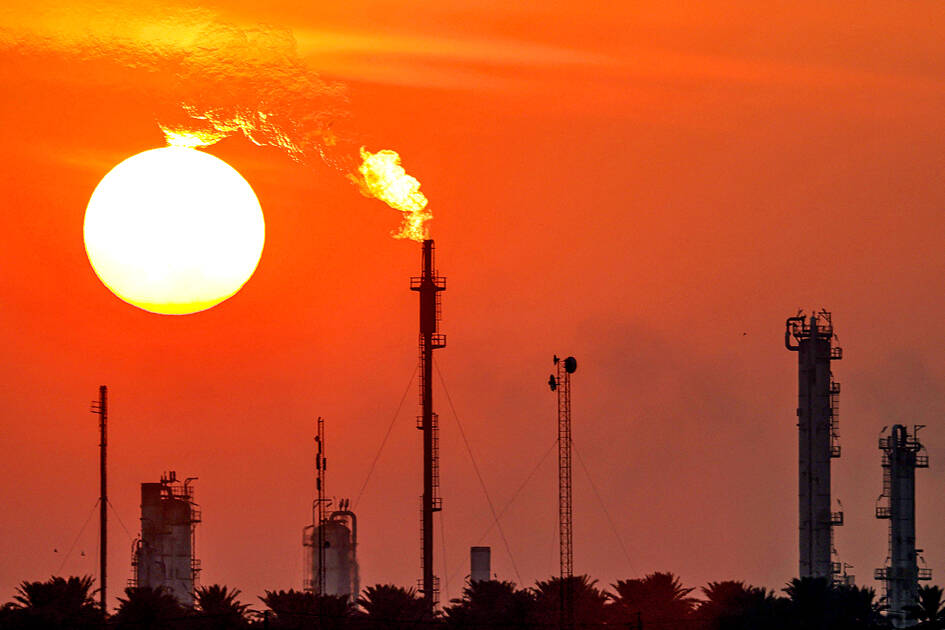Oil prices slumped yesterday after OPEC+ countries announced a sharp production increase despite oversupply concerns and growing fears that US President Donald Trump’s trade war could weaken demand.
Saudi Arabia, Russia and six other members of the oil cartel announced over the weekend an output increase of 411,000 barrels a day for next month, a month after a similar move had already caused prices to fall.
The price of crude has also been sliding because of fears of a global economic slowdown on the back of Trump’s tariff onslaught.

Photo: AFP
The OPEC+ move “confirms a stark turnaround away from the production cuts that have persisted since 2022,” Deutsche Bank AG said in a research note.
Oil prices fell almost 4 percent before paring back some losses. Brent, the international benchmark, was trading at just under US$60 per barrel at about 7:15am GMT.
Some analysts pointed to pressure from Trump to lower prices and expectations of declining Iranian oil exports amid tighter sanctions as possible reasons for the unexpected move.
Others said the motivation was unclear.
“The weekend news wasn’t a shocker, but the reasons behind the move remain uncertain,” Swissquote Bank Ltd senior analyst Ipek Ozkardeskaya said.
“The official communication says the group is bringing barrels back to the market because, fundamentals are healthy and inventories are low,” Ozkardeskaya said.
“Yet global growth expectations have been crumbling due to a heated trade war between the US and the rest of the world, and rising output only worsens oversupply concerns. So the real reason must be something else,” she added.
Some people said that the Saudis were “punishing” OPEC members who had not complied fully with the previous policy of cutting production, Ozkardeskaya said.
Other theories include that Trump wants to lower oil prices to hurt Russian finances and speed up the end of the Ukraine war, or that Riyadh wants to push out US shale businesses and increase its market share.
“We don’t know for sure. The exact motive remains unclear,” Ozkardeskaya said.

BYPASSING CHINA TARIFFS: In the first five months of this year, Foxconn sent US$4.4bn of iPhones to the US from India, compared with US$3.7bn in the whole of last year Nearly all the iPhones exported by Foxconn Technology Group (富士康科技集團) from India went to the US between March and last month, customs data showed, far above last year’s average of 50 percent and a clear sign of Apple Inc’s efforts to bypass high US tariffs imposed on China. The numbers, being reported by Reuters for the first time, show that Apple has realigned its India exports to almost exclusively serve the US market, when previously the devices were more widely distributed to nations including the Netherlands and the Czech Republic. During March to last month, Foxconn, known as Hon Hai Precision Industry

Taiwan Semiconductor Manufacturing Co (TSMC, 台積電) and the University of Tokyo (UTokyo) yesterday announced the launch of the TSMC-UTokyo Lab to promote advanced semiconductor research, education and talent development. The lab is TSMC’s first laboratory collaboration with a university outside Taiwan, the company said in a statement. The lab would leverage “the extensive knowledge, experience, and creativity” of both institutions, the company said. It is located in the Asano Section of UTokyo’s Hongo, Tokyo, campus and would be managed by UTokyo faculty, guided by directors from UTokyo and TSMC, the company said. TSMC began working with UTokyo in 2019, resulting in 21 research projects,

Ashton Hall’s morning routine involves dunking his head in iced Saratoga Spring Water. For the company that sells the bottled water — Hall’s brand of choice for drinking, brushing his teeth and submerging himself — that is fantastic news. “We’re so thankful to this incredible fitness influencer called Ashton Hall,” Saratoga owner Primo Brands Corp’s CEO Robbert Rietbroek said on an earnings call after Hall’s morning routine video went viral. “He really helped put our brand on the map.” Primo Brands, which was not affiliated with Hall when he made his video, is among the increasing number of companies benefiting from influencer

Quanta Computer Inc (廣達) chairman Barry Lam (林百里) yesterday expressed a downbeat view about the prospects of humanoid robots, given high manufacturing costs and a lack of target customers. Despite rising demand and high expectations for humanoid robots, high research-and-development costs and uncertain profitability remain major concerns, Lam told reporters following the company’s annual shareholders’ meeting in Taoyuan. “Since it seems a bit unworthy to use such high-cost robots to do household chores, I believe robots designed for specific purposes would be more valuable and present a better business opportunity,” Lam said Instead of investing in humanoid robots, Quanta has opted to invest